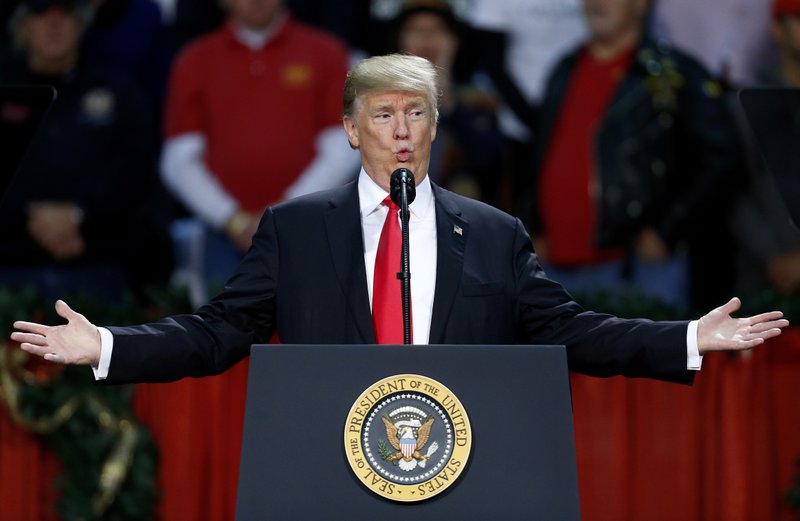WEST PALM BEACH, Fla. -- President Donald Trump on Sunday expressed optimism about lawmakers' efforts to finalize tax-cut legislation that he aims to sign by his self-imposed Christmas deadline.
Trump tweeted about the pending bill before he went to his golf club in West Palm Beach for a round with Republican Sen. Lindsey Graham of South Carolina. Trump and Graham, who has become a regular golf partner for Trump, discussed the tax bill and upcoming budget talks after they teed off, said White House spokesman Raj Shah.
"Getting closer and closer on the Tax Cut Bill. Shaping up even better than projected," Trump said on Twitter. "House and Senate working very hard and smart. End result will be not only important, but SPECIAL!"
Trump has set a Christmas deadline for signing the bill into law, giving lawmakers named to a special conference committee two weeks to iron out major differences in the House and Senate versions of the legislation. The conference committee has scheduled its first formal meeting for Wednesday.
[PRESIDENT TRUMP: Timeline, appointments, executive orders + guide to actions in first 200 days]
Both measures would cut taxes by about $1.5 trillion over the next decade while adding billions to the $20 trillion deficit, combining steep tax cuts for corporations with more modest reductions for most individuals. Together, the changes would amount to the biggest overhaul of the U.S. tax system in 30 years, touching every corner of society.
Significant differences between the bills must be worked out before Trump can fulfill a campaign promise and score his first major legislative achievement. Republican lawmakers, including Graham, have said publicly that failure on taxes -- after the collapse of several attempts to repeal President Barack Obama's 2010 health care law -- would be politically devastating with control of the House and Senate at stake in midterm elections next year.
"It would be a complete disaster," Graham said in October.
The House bill collapses the seven existing personal income tax brackets to four, while the Senate version retains the seven but changes their percentages. The mortgage interest deduction is more generous under the Senate bill. There are also questions about what to do with the alternative minimum tax and how to handle the tax treatment of millions of U.S. businesses organized as "pass-throughs," as well as the federal deduction for state and local income taxes.
The Senate bill ends the requirement that most consumers buy health insurance or pay a tax penalty, while the House measure avoids the issue.
"I can think of no better Christmas present for the American people than giving you a massive tax cut. That's what's happening," Trump said Friday night at a campaign rally in Pensacola. "I can't wait to sign that tax cut."
House Majority Leader Kevin McCarthy said Sunday that he's "very confident we're going to get this done" on the tax bill, partly thanks to Trump's enthusiastic cheerleading. "I've never watched a president so engaged," he said.
McCarthy said that despite the differences in the House and Senate bills, "structurally they're pretty similar."
"They're going to work out those differences," the California Republican said. "Hopefully they can get that done this week, we come back the next week and vote on it," McCarthy said.
Republican Sen. Susan Collins of Maine said she's confident agreements she sought as part of her support will be kept but hasn't made a final decision about the measure.
"I always wait until the final version of the bill is brought before us, before I make a final decision on whether or not to support it," Collins said on CBS' Face the Nation on Sunday. "There are major differences between the House and Senate bills, and I don't know where the bill is going to come out."
Collins cited a commitment from Senate Majority Leader Mitch McConnell of Kentucky and House Speaker Paul Ryan of Wisconsin that the tax bill wouldn't generate automatic cuts in Medicare, and said she's "absolutely confident" it will stand because she has it in writing from both leaders.
The Congressional Budget Office has said the House version of the tax proposal would trigger automatic spending cuts of 4 percent in fiscal 2018 to Medicare, as well as reductions in other programs, if a budget rule known as Paygo, short for pay-as-you-go, isn't waived.
The moderate Republican also sought a commitment that legislation would be considered regarding cost-sharing payments to bolster the individual health-insurance market. She said she's had "a lot of conversations" with members of the House and Senate and with Trump about it.
"I've talked to the president three times about this issue, and once again, I have no reason to believe that that commitment will not be kept," Collins said. "After all, who wants to see health-insurance premiums become more unaffordable than they already are?"
Information for this article was contributed by Darlene Superville of The Associated Press; and by Jennifer Jacobs and Mark Niquette of Bloomberg News.
A Section on 12/11/2017
